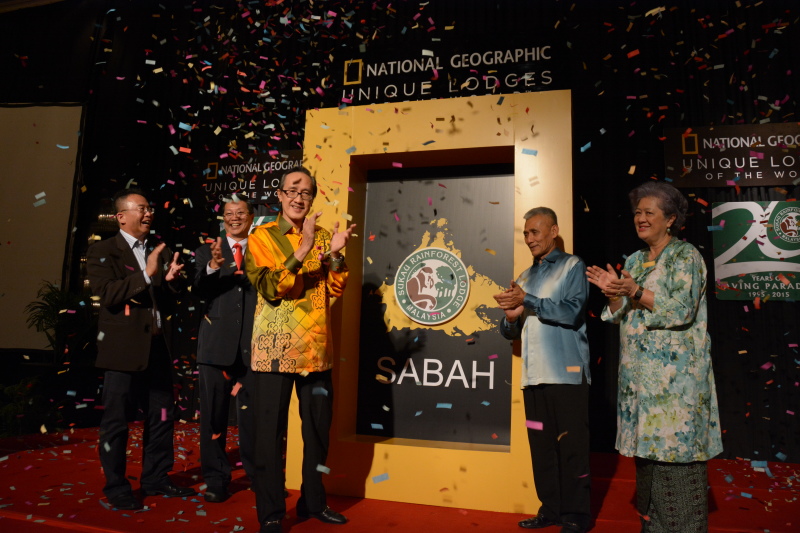jessica2015-01-15T12:15:16+08:00KUDAT: The State Government's announcement that it will consider gazetting Tun Mustapha Park (TMP) at Kudat waters this year is well-received by World Wide Fund for Nature-Malaysia (WWF-Malaysia) Sabah Office.
In November last year, Chief Minister Datuk Seri Musa Aman said as much when tabling the State 2015 Budget at the State Assembly sitting.
The proposed TMP covers a total area of 1,092,420 hectares, stretching to the Malaysia-Philippine maritime border involving some 50 islands off Kudat, Kota Marudu and Pitas.
Apart from being a critical habitat for corals, mangrove swamps and seaweed, the proposed park area is rich in natural resources that provide livelihood and food sources for more than 80,000 people within and beyond the Coral Triangle boundary.
To be managed by Sabah Parks, the park will also serve as a corridor for a safe passage for endangered marine species such as whales, dolphins and dugong as well as turtles.
Deputy Head of WWF-Malaysia Marine Progamme, Robecca Jumin said the gazettement of TMP has taken a long journey with support from various partners since the Government's approval in March 2006.
"We are approaching the gazettement target by 2015. Since 2006, WWF-Malaysia has been working in the area to build the capacity of stakeholders to be part of the planning and development process of TMP, as well as for its future implementation," she said.
Towards this end, Robecca said, one strategy was to form community groups and organisations that will enable the community to work with each other and play a significant role in the effective management of TMP.
Such groups include the Maliangin Islands Community Association (MICA), Banggi Youth Club (BYC), Berungus Community and Kudat Turtle Conservation Society (KTCS).
"They can be leaders in marine conservation in TMP. It is clear that for TMP to be effective and sustainable, continued stakeholder support, and ocal and international partnership are important," she added.
WWF-Malaysia's Community-based Resource Management & Conservation of Marine Biodiversity in the Proposed Tun Mustapha Park (TMP) is one of the 17 GEF-SGP (Global Environment Facility-Small Grants Programme) projects in Sabah.
The Small Grants Programme (SGP) is funded by the Global Environment Facility (GEF), implemented by the United Nations Development Programme (UNDP) and executed by the United Nations Office for Project Services (UNOPS).
At the recent National GEF-SGP Seminar in Petaling Jaya, Robecca received a grant of USD148,000 for WWF-Malaysia's project in Kudat, Banggi and Kota Marudu.
In her presentation on MPA (Marine Protected Areas) & People : Building Stakeholder Support for the Proposed Tun Mustapha Park (TMP), she said WWF-Malaysia is promoting conservation efforts with the local community in Kudat in support of the Government's initiative to gazette the proposed TMP.
"Once gazetted, the proposed TMP will be the largest marine park in Malaysia. It will be a unique paradigm changing park as it will be the first multiple use park, with zoning system and collaborative management as its management approach.
"This brings forward the important role of stakeholders in the effective management of TMP once gazetted, especially the local communities within and around the proposed park," she said.
With available SGP funding, Robecca said the project will focus on three key pilot sites to demonstrate the benefits of Marine Protected Areas (MPA) and ultimately build support for TMP and the capacity of the communities to co-manage their natural resources.
The sites are at Tigabu Island (72km off Kudat), Kg Batu Siri on Balambangan Island and Kg Taritipan in Kota Marudu. Residents on Tigabu Island farm sea cucumbers as their main source of income, which is supplemented by fishing activity in the proposed TMP area.
Trained in Marine Science and Aquatic Biodiversity Conservation and Monitoring, Robecca has more than 13 years of working experience with WWF-Malaysia, promoting marine conservation, including the establishment of the Tri-National Sulu Sulawesi Marine Ecoregion (SSME) Programme from 2001 to 2004, and the establishment and gazettement of TMP since 2006.
Since September 2014, she has led the WWF-Malaysia Marine Programme, working to implement marine conservation strategies on sustainable fisheries through ecosystem management, sustainable seafood, species protection and sustainable seascape through integrated ocean management.
Source: Daily Express
 Celebrating Sukau Rainforest Lodge- 20 Years Operation & National Geographic Unique Lodges of the World Celebration held on the 13th of February 2015 at Shangri-La Tanjung Aru Resort, Kota Kinabalu. Congratulations to Sukau Rainforest Lodge and Borneo Eco Tours Sdn Bhd.
Menghadiri Majlis Koktel 'Sukau Rainforest Lodge - 20 Years Operation & National Geographic Unique Lodges Of The World Celebration' pada 13 Februari 2015 bertempat di Shangri La Tanjung Aru Resort Kota Kinabalu. Tahniah kepada Sukau Rainforest Lodge dan Borneo Eco Tours Sdn Bhd.
Celebrating Sukau Rainforest Lodge- 20 Years Operation & National Geographic Unique Lodges of the World Celebration held on the 13th of February 2015 at Shangri-La Tanjung Aru Resort, Kota Kinabalu. Congratulations to Sukau Rainforest Lodge and Borneo Eco Tours Sdn Bhd.
Menghadiri Majlis Koktel 'Sukau Rainforest Lodge - 20 Years Operation & National Geographic Unique Lodges Of The World Celebration' pada 13 Februari 2015 bertempat di Shangri La Tanjung Aru Resort Kota Kinabalu. Tahniah kepada Sukau Rainforest Lodge dan Borneo Eco Tours Sdn Bhd.



